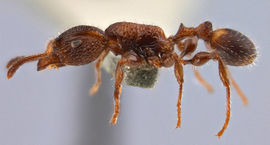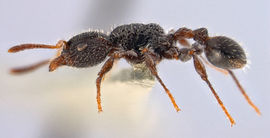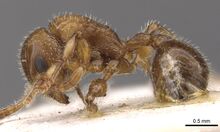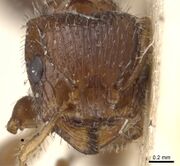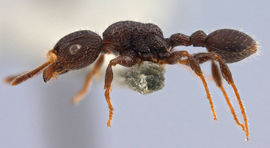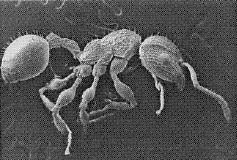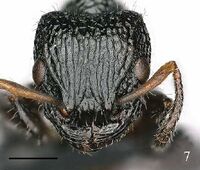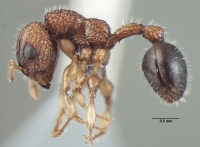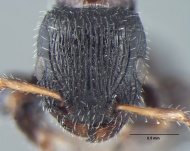Key to Dilobocondyla Species
This worker key is modified from: Chen, Z., Li, W., Zhou, S. 2019. Taxonomic review of the ant genus Dilobocondyla from China (Hymenoptera: Formicidae), with a revised key to the known species. Zoological Systematics 44(2): 132–139 (doi:10.11865/zs.201908).
The key is based on keys by Wheeler (1924[1]), Bharti and Kumar (2013[2]), and Zettel and Bruckner (2013[3])
You may also be interested in
1
- Head in full-face view with posterior margin strongly and continuously concave (except for D. fulva) (Philippines) . . . . . 2
- Head in full-face view with posterior margin nearly straight or only weakly concave in middle . . . . . 8
2
return to couplet #1
- Petiole with a sharp and highly raised transverse ridge; anterodorsal face of postpetiole with conspicuous longitudinal rugae (Philippines) . . . . . Dilobocondyla carinata
- Petiole without transverse ridge; anterodorsal face of postpetiole differently sculptured, without conspicuous longitudinal rugae . . . . . 3
3
return to couplet #2
- Mesosoma entirely or chiefly blackish brown or black . . . . . 4
- Mesosoma yellowish to light brown . . . . . 6
4
return to couplet #3
- Antennal scrobe moderately developed, dorsally limited by fine frontal carina that posteriorly fading and not reaching posterior corners of head (Indo-Australian Region) . . . . . Dilobocondyla selebensis
- Antennal scrobe strongly developed, dorsally limited by prominent frontal carina that reaches posterior corner of head . . . . . 5
5
return to couplet #4
- Gastral tergite I with yellow base (Philippines) . . . . . Dilobocondyla rugosa
- Gastral tergite I entirely dark (Philippines) . . . . . Dilobocondyla silviae
6
return to couplet #3
- Frontal carinae not continuing to posterior corners of head and not so prominent; antennal scrobes moderately deep (Australia and New Guinea) . . . . . Dilobocondyla cataulacoidea
- Frontal carinae prominent, continuing to posterior corners of head; scrobes deeper . . . . . 7
7
return to couplet #7
- Boundary unconspicuous between dorsum of propodeum and declivity. Dorsum of mesosoma with reticulation, interspaces smooth and shining (Singapore) . . . . . Dilobocondyla fulva
- Boundary conspicuous between dorsum of propodeum and declivity. Dorsum of mesosoma with irregular rugae, appear dull (Philippines) . . . . . Dilobocondyla chapmani
8
return to couplet #1
- Mesosoma, petiole, postpetiole and gaster almost unanimously color . . . . . 9
- Mesosoma, petiole, postpetiole and gaster distinctly bicolor . . . . . 14
9
return to couplet #8
- Anterior margin of pronotum with distinct ridge (Sri Lanka) . . . . . Dilobocondyla didita
- Anterior margin of pronotum without ridge . . . . . 10
10
return to couplet #9
- Posterior margin of head nearly straight. Petiole relatively shorted, with DPI ≥0.60 (Philippines) . . . . . Dilobocondyla oswini
- Posterior margin of head with concavity at its middle. Petiole relatively elongated, with DPI≤0.52 . . . . . 11
11
return to couplet #10
- Dorsal margin of propodeum in lateral view distinctly lower than pronotum (India) . . . . . Dilobocondyla bangalorica
- Dorsal margin of propodeum in lateral view almost at same level with pronotum, or slightly lower than pronotum . . . . . 12
12
return to couplet #11
- Body brownish black; frontal triangle indistinct (Indo-Australian Region) . . . . . Dilobocondyla borneensis
- Body red or yellowish brown; frontal triangle distinct . . . . . 13
13
return to couplet #12
- Head slightly longer than width; clypeus with delicate carinae, with anterior margin feebly emarginated in middle. Petiole much longer, more than twice length of width (Indonesia) . . . . . Dilobocondyla karnyi
- Head wider than length; clypeus with a strong median and two lateral carinae, with anterior margin strongly emarginate in middle. Petiole comparatively short, less than twice length of width (Malaysia) . . . . . Dilobocondyla yamanei
14
return to couplet #8
- Mesosoma, petiole and postpetiole black; gaster distinctly reddish brown (China) . . . . . Dilobocondyla rufida
- Mesosoma, petiole and postpetiole yellowish to blackish red; gaster brown to black . . . . . 15
15
return to couplet #14
- Gaster paler, with yellow pilosity (Indonesia) . . . . . Dilobocondyla sebesiana
- Gaster brown to black, with whitish pilosity . . . . . 16
16
return to couplet #15
- Petiole more than 2.5 times length of width; dorsal margin weakly convex . . . . . 17
- Petiole less than 2 times length of width; dorsal margin distinct convex . . . . . 18
17
return to couplet #16
- Clypeus with 5 strong carinae. Body dorsum with subdecumbent hairs (China) . . . . . Dilobocondyla gaoyureni
- Clypeus with 3 strong carinae. Body dorsum with stiff erect hairs (Vietnam) . . . . . Dilobocondyla propotriangulata
18
return to couplet #16
- Gaster smooth and shiny. Legs smooth, yellowish brown (China and Vietnam) . . . . . Dilobocondyla fouqueti
- Gaster reticulate and opaque. Legs opaque with fine sculpture, blackish . . . . . 19
19
return to couplet #18
- Posterior corners of head blunt and not forming a dent. Posterior 1/3 of head dorsum without reticulation (Vietnam) . . . . . Dilobocondyla eguchii
- Posterolateral corners of head acute and forming a dent. Posterior 1/3 of head dorsum with reticulation . . . . . 20
20
return to couplet #19
- Head castaneous. Anterior lateral angles of pronotum acute. Dorsum of petiole slightly convex in profile. Petiole with a digitation (Indonesia) . . . . . Dilobocondyla selebensis simalurana
- Head blackish. Anterior lateral angles of pronotum blunt. Dorsum of petiole arcuate in profile. Petiole with a strong antero-ventral tooth (India) . . . . . Dilobocondyla gasteroreticulata
References
- ↑ Wheeler, W. M. 1924c. Ants of Krakatau and other islands in the Sunda Strait. Treubia 5: 239-258.
- ↑ Bharti, H. & Kumar, R. 2013. Five new species of Dilobocondyla (Hymenoptera: Formicidae) with a revised key to the known species. Asian Myrmecology 5, 29-44.
- ↑ Zettel, H. & Bruckner, H. 2013. Four new species of Dilobocondyla (Hymenoptera: Formicidae) from the Philippines. Zeitschrift der Arbeitsgemeinschaft Österreichischer Entomologen 65:135-150.

